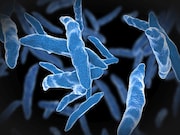Short regimen of nine to 11 months noninferior to 20-month regimen following WHO guidelines
WEDNESDAY, March 13, 2019 (HealthDay News) — A short regimen is noninferior to a long regimen for patients with rifampin-resistant tuberculosis that is susceptible to fluoroquinolones and aminoglycosides, according to a study published online March 13 in the New England Journal of Medicine.
Andrew J. Nunn, from University College London, and colleagues conducted a phase 3 noninferiority trial in participants with rifampin-resistant tuberculosis that was susceptible to fluoroquinolones and aminoglycosides. A total of 424 participants were randomly assigned in a 2:1 ratio to receive a short regimen (nine to 11 months), including high-dose moxifloxacin, or a long regimen (20 months) following 2011 World Health Organization guidelines. Three hundred eighty-three participants were included in the modified intention-to-treat population.
The researchers found that 79.8 percent of participants in the long-regimen group and 78.8 percent in the short-regimen group reported favorable status at 132 weeks; with adjustment for HIV status, the difference was 1.0 percent (95 percent confidence interval, −7.5 to 9.5 percent; P = 0.02 for noninferiority). With respect to noninferiority, the results were consistent among the 321 participants in the per-protocol population (adjusted difference, −0.7 percent; 95 percent confidence interval, −10.5 to 9.1).
“Although the results of this trial are encouraging, further research remains essential to find a short, simple regimen for multidrug-resistant tuberculosis that results in efficacy and safety outcomes that are similar to those for drug-susceptible tuberculosis,” the authors write.
Copyright © 2019 HealthDay. All rights reserved.








